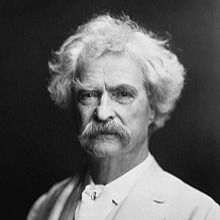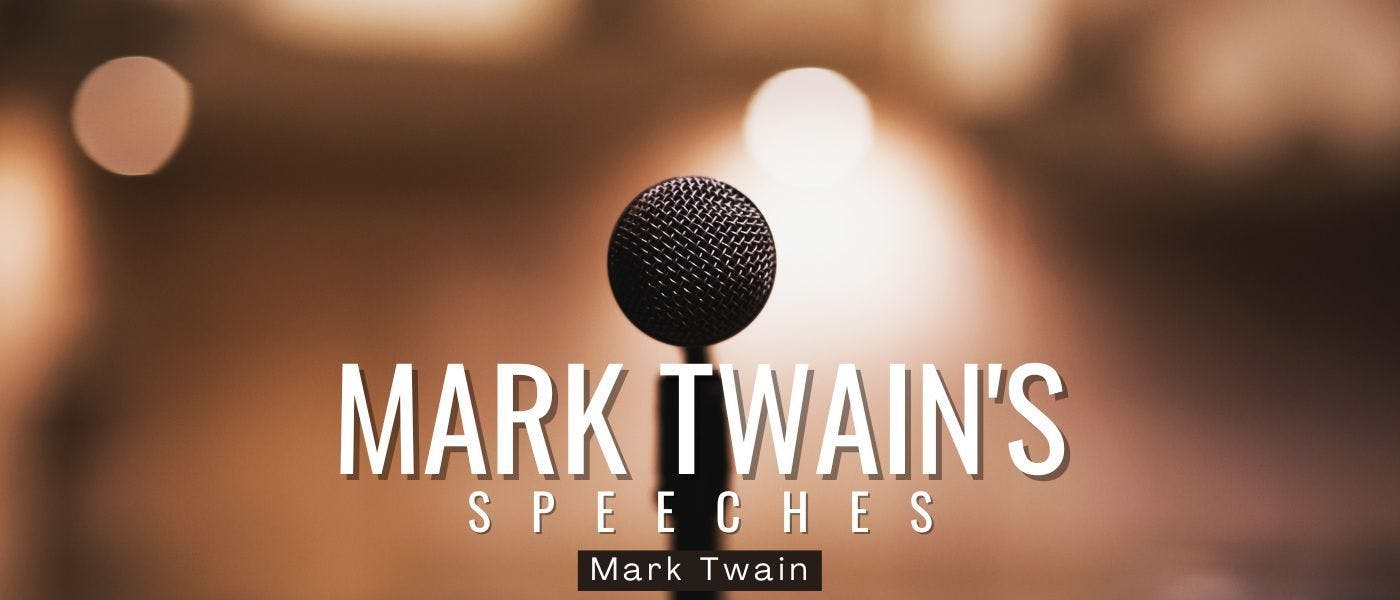Mark Twain's Speeches by Mark Twain, is part of the HackerNoon Books Series. You can jump to any chapter in this book here. FULTON DAY, JAMESTOWN
FULTON DAY, JAMESTOWN
ADDRESS DELIVERED SEPTEMBER 23, 1907
Lieutenant-Governor Ellyson, of Virginia, in introducing Mr.
Clemens, said:
“The people have come here to bring a tribute of affectionate
recollection for the man who has contributed so much to the
progress of the world and the happiness of mankind.” As Mr.
Clemens came down to the platform the applause became louder
and louder, until Mr. Clemens held out his hand for silence.
It was a great triumph, and it was almost a minute after the
applause ceased before Mr. Clemens could speak. He attempted
it once, and when the audience noticed his emotion, it cheered
again loudly.
LADIES AND GENTLEMEN,—I am but human, and when you, give me a reception like that I am obliged to wait a little while I get my voice. When you appeal to my head, I don’t feel it; but when you appeal to my heart, I do feel it.
We are here to celebrate one of the greatest events of American history, and not only in American history, but in the world’s history.
Indeed it was—the application of steam by Robert Fulton.
It was a world event—there are not many of them. It is peculiarly an American event, that is true, but the influence was very broad in effect. We should regard this day as a very great American holiday. We have not many that are exclusively American holidays. We have the Fourth of July, which we regard as an American holiday, but it is nothing of the kind. I am waiting for a dissenting voice. All great efforts that led up to the Fourth of July were made, not by Americans, but by English residents of America, subjects of the King of England.
They fought all the fighting that was done, they shed and spilt all the blood that was spilt, in securing to us the invaluable liberties which are incorporated in the Declaration of Independence; but they were not Americans. They signed the Declaration of Independence; no American’s name is signed to that document at all. There never was an American such as you and I are until after the Revolution, when it had all been fought out and liberty secured, after the adoption of the Constitution, and the recognition of the Independence of America by all powers.
While we revere the Fourth of July—and let us always revere it, and the liberties it conferred upon us—yet it was not an American event, a great American day.
It was an American who applied that steam successfully. There are not a great many world events, and we have our full share. The telegraph, telephone, and the application of steam to navigation—these are great American events.
To-day I have been requested, or I have requested myself, not to confine myself to furnishing you with information, but to remind you of things, and to introduce one of the nation’s celebrants.
Admiral Harrington here is going to tell you all that I have left untold. I am going to tell you all that I know, and then he will follow up with such rags and remnants as he can find, and tell you what he knows.
No doubt you have heard a great deal about Robert Fulton and the influences that have grown from his invention, but the little steamboat is suffering neglect.
You probably do not know a great deal about that boat. It was the most important steamboat in the world. I was there and saw it. Admiral Harrington was there at the time. It need not surprise you, for he is not as old as he looks. That little boat was interesting in every way. The size of it. The boat was one [consults Admiral], he said ten feet long. The breadth of that boat [consults Admiral], two hundred feet. You see, the first and most important detail is the length, then the breadth, and then the depth; the depth of that boat was [consults again]—the Admiral says it was a flat boat. Then her tonnage—you know nothing about a boat until you know two more things: her speed and her tonnage. We know the speed she made. She made four miles—-and sometimes five miles. It was on her initial trip, on, August 11, 1807, that she made her initial trip, when she went from [consults Admiral] Jersey City—to Chicago. That’s right. She went by way of Albany. Now comes the tonnage of that boat. Tonnage of a boat means the amount of displacement; displacement means the amount of water a vessel can shove in a day. The tonnage of man is estimated by the amount of whiskey he can displace in a day.
Robert Fulton named the ‘Clermont’ in honor of his bride, that is, Clermont was the name of the county-seat.
I feel that it surprises you that I know so much. In my remarks of welcome of Admiral Harrington I am not going to give him compliments. Compliments always embarrass a man. You do not know anything to say. It does not inspire you with words. There is nothing you can say in answer to a compliment. I have been complimented myself a great many times, and they always embarrass me—I always feel that they have not said enough.
The Admiral and myself have held public office, and were associated together a great deal in a friendly way in the time of Pocahontas. That incident where Pocahontas saves the life of Smith from her father, Powhatan’s club, was gotten up by the Admiral and myself to advertise Jamestown.
At that time the Admiral and myself did not have the facilities of advertising that you have.
I have known Admiral Harrington in all kinds of situations—in public service, on the platform, and in the chain-gang now and then—but it was a mistake. A case of mistaken identity. I do not think it is at all a necessity to tell you Admiral Harrington’s public history. You know that it is in the histories. I am not here to tell you anything about his public life, but to expose his private life.
I am something of a poet. When the great poet laureate, Tennyson, died, and I found that the place was open, I tried to get it—but I did not get it. Anybody can write the first line of a poem, but it is a very difficult task to make the second line rhyme with the first. When I was down in Australia there were two towns named Johnswood and Par-am. I made this rhyme:
“The people of Johnswood are pious and good;
The people of Par-am they don’t care a——.”
I do not want to compliment Admiral Harrington, but as long as such men as he devote their lives to the public service the credit of the country will never cease. I will say that the same high qualities, the same moral and intellectual attainments, the same graciousness of manner, of conduct, of observation, and expression have caused Admiral Harrington to be mistaken for me—and I have been mistaken for him.
A mutual compliment can go no further, and I now have the honor and privilege of introducing to you Admiral Harrington.
About HackerNoon Book Series: We bring you the most important technical, scientific, and insightful public domain books.
This book is part of the public domain. Mark Twain (2004). Mark Twain's Speeches. Urbana, Illinois: Project Gutenberg. Retrieved October 2022 https://www.gutenberg.org/cache/epub/3188/pg3188-images.html
This eBook is for the use of anyone anywhere at no cost and with almost no restrictions whatsoever. You may copy it, give it away or re-use it under the terms of the Project Gutenberg License included with this eBook or online at www.gutenberg.org, located at https://www.gutenberg.org/policy/license.html.

